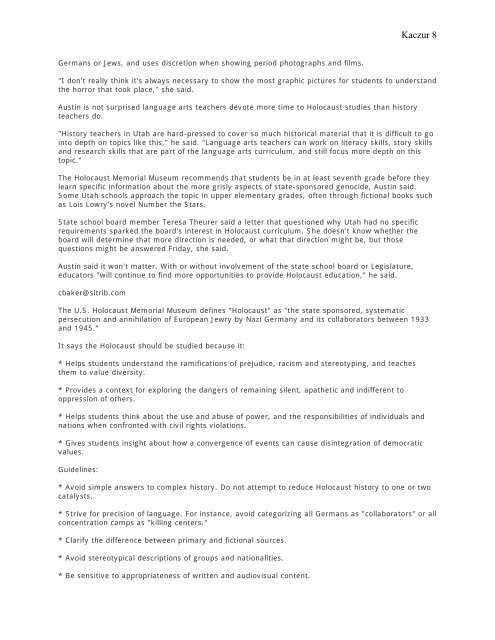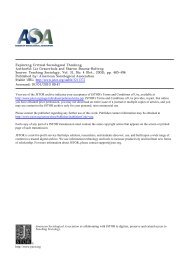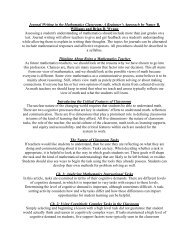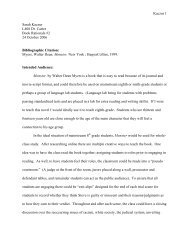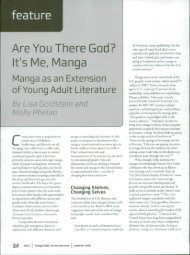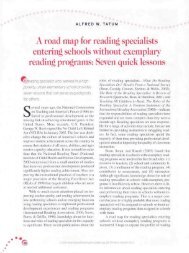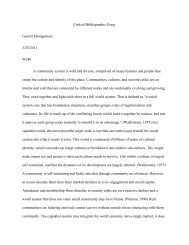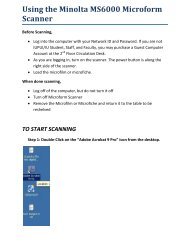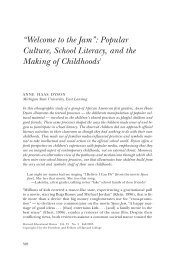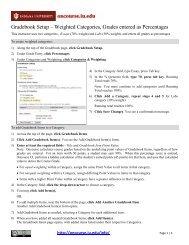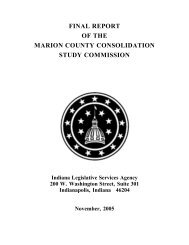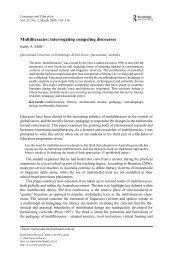Night. Night - Oncourse
Night. Night - Oncourse
Night. Night - Oncourse
You also want an ePaper? Increase the reach of your titles
YUMPU automatically turns print PDFs into web optimized ePapers that Google loves.
Kaczur 8<br />
Germans or Jews, and uses discretion when showing period photographs and films.<br />
"I don't really think it's always necessary to show the most graphic pictures for students to understand<br />
the horror that took place," she said.<br />
Austin is not surprised language arts teachers devote more time to Holocaust studies than history<br />
teachers do.<br />
"History teachers in Utah are hard-pressed to cover so much historical material that it is difficult to go<br />
into depth on topics like this," he said. "Language arts teachers can work on literacy skills, story skills<br />
and research skills that are part of the language arts curriculum, and still focus more depth on this<br />
topic."<br />
The Holocaust Memorial Museum recommends that students be in at least seventh grade before they<br />
learn specific information about the more grisly aspects of state-sponsored genocide, Austin said.<br />
Some Utah schools approach the topic in upper elementary grades, often through fictional books such<br />
as Lois Lowry's novel Number the Stars.<br />
State school board member Teresa Theurer said a letter that questioned why Utah had no specific<br />
requirements sparked the board's interest in Holocaust curriculum. She doesn't know whether the<br />
board will determine that more direction is needed, or what that direction might be, but those<br />
questions might be answered Friday, she said.<br />
Austin said it won't matter. With or without involvement of the state school board or Legislature,<br />
educators "will continue to find more opportunities to provide Holocaust education," he said.<br />
cbaker@sltrib.com<br />
The U.S. Holocaust Memorial Museum defines "Holocaust" as "the state sponsored, systematic<br />
persecution and annihilation of European Jewry by Nazi Germany and its collaborators between 1933<br />
and 1945."<br />
It says the Holocaust should be studied because it:<br />
* Helps students understand the ramifications of prejudice, racism and stereotyping, and teaches<br />
them to value diversity.<br />
* Provides a context for exploring the dangers of remaining silent, apathetic and indifferent to<br />
oppression of others.<br />
* Helps students think about the use and abuse of power, and the responsibilities of individuals and<br />
nations when confronted with civil rights violations.<br />
* Gives students insight about how a convergence of events can cause disintegration of democratic<br />
values.<br />
Guidelines:<br />
* Avoid simple answers to complex history. Do not attempt to reduce Holocaust history to one or two<br />
catalysts.<br />
* Strive for precision of language. For instance, avoid categorizing all Germans as "collaborators" or all<br />
concentration camps as "killing centers."<br />
* Clarify the difference between primary and fictional sources.<br />
* Avoid stereotypical descriptions of groups and nationalities.<br />
* Be sensitive to appropriateness of written and audiovisual content.


